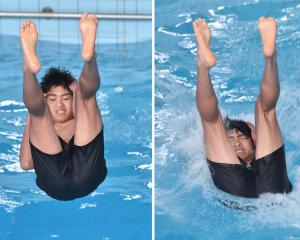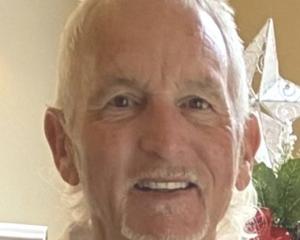Inspector Dave Campbell (61) last week retired after a 40-year police career.
His career included undercover drug work, facing student riots, being on call 24/7 for 25 continuous years, and as commander of the Dunedin armed offenders squad during the Aramoana massacre. He spoke to reporter Hamish McNeilly before he finished.
It was shaping as a quiet shift.
Suddenly, every 111 light lit up near Dave Campbell's desk.
''Never seen that before,'' he said, recalling the events of November 13, 1990.
Harrowing calls about a man shooting people in the seaside township of Aramoana prompted the then senior sergeant to call out the Dunedin armed offenders squad, which he commanded.
''Nothing can prepare you for something that extreme, however the training ... when the pressure is on ... you seem to go into automatic mode.''
Several members of the squad, including Sergeant Stewart Guthrie, of Port Chalmers, went to the scene as first responders.
''While we were getting kitted up, Stew was giving us commentary over the radio. One thing I remember him saying as he got an eyeball on the offender was 'he has got a semi-automatic rifle with an evil-looking magazine'.''
Sgt Guthrie, who was armed with a revolver, transmitted via his radio ''stop, David, stop, or I will shoot''.
''Then there were gunshots and that obviously was when Stew was killed,'' Mr Campbell said.
That evening, squad members were within 100m of where Sgt Guthrie was killed. A house burning nearby lit up the night, but they did not know the location of gunman David Gray.
''It was just unbelievable; with the burning house it was like a wartime movie.
''There were bodies everywhere. We came across bodies as we moved into position and the guys were checking them for a pulse but it was quite evident that people had been killed.''
At an intersection, they heard wounded resident Chris Cole calling ''help me, help me''.
The decision was made to evacuate him, ''an incredibly hard decision to make''.
''It is all very well to be heroic, but if you end up getting you or your staff killed, you are no help to anybody.''
A new police dog van was used to evacuate Mr Cole ''and as they backed up, the door was left open and it caught on a flax bush and bent the door right back''.
''It is funny what you remember.''
More evacuations followed, including children and the first police at the scene.
''One girl survived and that made it really worthwhile,'' he said.
''We hunkered down because we did not know where Gray was, but a few times during the night some shots were fired.''
At dawn, the squad was replaced.
''We needed to be relieved, because we weren't capable of doing any more, because we had done too much.''
Squad members opted to stay at the scene, as reinforcements including other AOS squads and the anti-terrorist squad (ATS) replaced them.
Fourteen people, including Gray who was shot by ATS members, died in the massacre.
Mr Campbell said he bore no grudge or hatred towards David Gray who ''was mad ... he had just lost it''.
The days following the massacre were spent writing debriefs and reports, and ''I felt strung out''.
''We had a job a week afterwards, and I said I don't want to command this because I wasn't 100%.''
Mr Campbell said in a report he recommended AOS equipment be better.
''David Gray with a semi-automatic rifle could lay down as much lead as the whole AOS at any point in time. We had single-shot weapons ... we didn't have the same firepower ability and I thought that needed to change.''
For his role at Aramoana, he received the Police Commissioners' merit award, an award he was honoured to receive but did not want to talk about.
Mr Campbell was involved with the AOS for 18 years before stepping aside in 2002.
That stint, when combined with his later role as Dunedin area commander, meant he had spent 25 years being on call 24/7.
''The family came second many times,'' he said in reference to wife Sue and their three children.
That dedication during his four decades of policing almost happened by accident.
As a long-haired University of Otago law student, he ''mucked around a bit and decided I needed to do something to grow up''.
A holiday job in 1974 delivering soft drink for Lane Thomson took him to the local police bar, when he began thinking policing could be as a possible fill-in career for a couple of years.
The recruiting officer told him they had a job for him.
Sent to Wellington and put through a week-long course on undercover policing, he was told ''don't cut your hair, don't change your appearance''.
Soon he was sent to locate drug dealers at hotels and rock concerts, and in one memorable job was sent to Auckland to buy a quantity of buddha sticks (cannabis skewered on a stem).
Given $11,000 - more than three times a constable's salary - he was told ''don't lose the money''.
Two drug dealers visited him in a flat for the exchange but later returned with a bikie enforcer and ''I could see this was going to be a rip-off''.
Things started getting very heated when the drug squad burst in to arrest the men, including the undercover officer.
Mr Campbell said being an undercover officer was often scary, ''with people questioning you all the time if you were an undercover cop because there was a lot of paranoia in the drug scene''.
He recalled being a uniformed officer posted to Invercargill when his training wing buddy and former flatmate, Constable Peter William Murphy (21), was shot while attending a break-in at a sports shop on September 25, 1976.
''That was a real wake-up call. It brought home the realities of policing.''
During his Invercargill stint, he trained and qualified as a detective, and later served as a sergeant in Wellington for 18 months.
''It was just so incredibly violent ... I was present when two people died from stab wounds.''
A desire to be closer to family saw him and Sue return to Dunedin in 1983.
That included time as a detective sergeant with the drug squad, which ''meant you come back to work in the evenings, crash out a warrant and kick in the door''.
In 1994, he became an inspector and was officially appointed Dunedin area commander five years later.
That role involved working alongside community partners, including the Dunedin City Council and the University of Otago.
He noted that while police now widely used pre-charge warnings for first time offenders ''in Dunedin we have had that for years, as we would just refer minor offences to the Proctor's Office''.
''Those people never came again, as one fright was more than enough.
Under his watch, he experienced student unrest and Undie 500s, and when the footage is replayed on television it ''still makes me cringe''.
''It is so damaging to the city and the university.''
Instances of mass disorder presented police with ''a no-win situation'', he said.
''We try to avoid our guys wearing the protective gear, because it is like red rag to a bull, but of course we have an obligation to protect our staff.''
He recalled getting a rock to the kneecap after pulling students away from the front of a police skirmish line moving down Castle St.
''I had made a cardinal mistake. I always said commanders should stand back and hold the clipboard.''
He was also proud of an opinion piece on the Undie 500 published in The Press in Christchurch, which led to the event being cancelled.
And like the organisers of the Undie 500, he knew when his own time was up.
He is now taking on the role of Dunedin North returning officer with the Electoral Commission.
''I have had people asking me why I am leaving, but I would rather it was that than 'why is he still there?'''
''It was a hard decision to make. I have loved my time with the New Zealand Police.''











